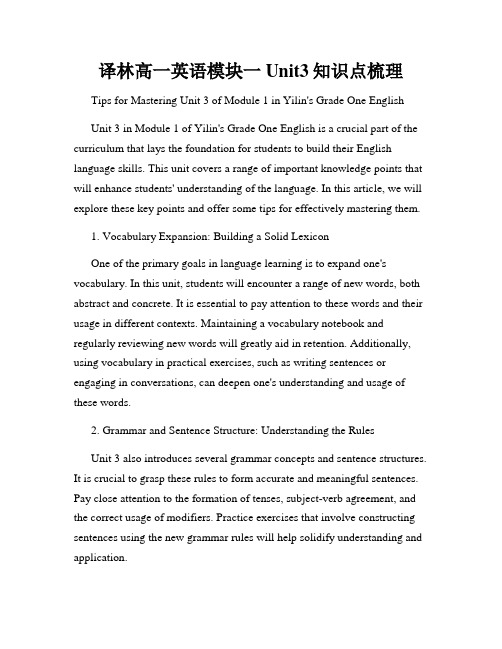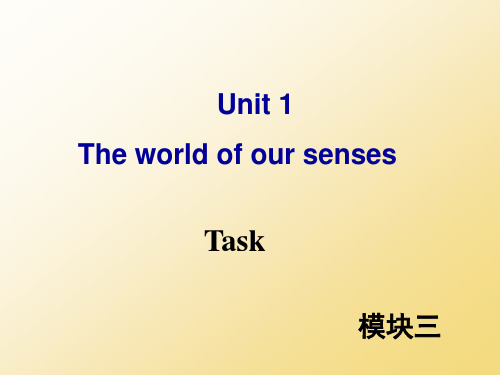(完整word版)译林牛津版高中模块三第一单元知识点总结讲解
牛津译林新教材 必修第三册 Unit1词汇讲解(全)精选全文完整版

可编辑修改精选全文完整版牛津译林必修三Unit1 词汇全解1.harm 伤害,损害n. do harm to =be harmful toharmful effects害处短语搭配:cause ~引起伤害There is no harm in (sb’s) doing sth./It does no harm (for sb) to do sth.做某事没什么坏处。
He looks fierce, but he means no harm.他看上去很凶,但并无恶意。
The treatment they gave him did him more harm than good.他们的治疗弊大于利。
V. harm 伤害,损害2.overseas在海外,在国外=abroadThe product is sold both at home and overseas.外国的,海外的~ trade/visitors3.region地区,区域---regional区域的,地区的~ variations 地区差异4.length长度The room is twice the length of the kitchen.房间长度是厨房的两倍。
The river is 300 miles in length.这条河长300英里。
the length of time时间长短重点短语:at length/ at ...(length)length 长时间,详尽地We have discussed the matter at great length.go to any/some/great lengths (to do)竭尽全力,不遗余力5.biodiversity 生物多样性diversity 多样性diverse 多样的diversify 使...多样化6.variety不同种类a ~ of =varieties of 各种各样的He resigned for a variety of reasons.多样化We all need variety in our diet.我们都需要饮食多样化。
译林牛津版本高中模块三第一单元总结复习学习知识点总结计划讲解

模三Unit 1The world of our sensesI要点短1. sense1) [C] 感官 five senses the sense of smell/taste/touch/sight/hearing2)[C] ⋯⋯的感 / 能力a sense of humor / direction / success/ duty/ locality( 方向 )3) [U] 辨力 common sense常a man of sense有理智的人a man of good sense 知书达礼的人4) [U] 意、价There is no sense in doing sth.There's no sense in waiting three hours.等三小是无心的。
5)表示 " 神智 " ,常用 one's senses bringsb. to one's senses 使某人醒来come to one's senses醒来 out of / lose one's senses 失掉神智6)理解;会He sensed that his proposals were unwelcome. 他得他的建不受迎。
用:make sense存心;有道理,得通;意思清楚(make sense=be meaningful存心)make sense of 理解;懂;理解in a sense 在某一方面;就某种意来in no sense 决不是 , 决非in some sense在某种意上out of one's (right) sense 失态 , 失掉理智 , 神乱 There is nosense in doing...做...是没有道理的 /意的。
There is somesense in doing...做...是有一些 /道理的 /意的。
译林牛津版高中英语(必修三)(全册知识点语法考点梳理、重点题型分类巩固练习)(家教、补习、复习用)

译林⽜津版⾼中英语(必修三)(全册知识点语法考点梳理、重点题型分类巩固练习)(家教、补习、复习⽤)译林⽜津版⾼中英语(必修三)重难点突破全册知识点梳理及重点题型举⼀反三巩固练习Unit 1 The world of our sense语⾔点(⼀)⽬标认知重点词汇raise,sign,confuse,fare,observe,glance,narrow,approach,darkness,hesitate,graspstare,anxious,aid,relief,sense,cover,wonder,副词this/that, beat, still, chance重点短语in/within sight,wish for,reach out,watch out for,so far, go hungry,get across重点句型find sb./sth. + 宾语补⾜语by the time知识讲解重点词汇raise【原句回放】Blind people can read by touching letters in raised dots called Braille.(P1)盲⼈通过触摸突起的字母的⽅式阅读被称为‘Braille’。
【点拨】raise vt.(1)举起,抬起,扬起,升起She raised her finger to her lips as a sign for silence.她把⼿指放在嘴边⽰意要安静。
[辨析]raise,lift,riseraise为及物动词,指将某⼈、某物或声⾳“提升,抬⾼”到更⾼的位置。
He raised his head.他抬起头来。
lift为及物动词,指将物体从较低处“举起”到较⾼处。
Lift me up,mummy.I can’t see.妈妈,把我抱起来,我看不见。
rise为不及物动词,指⽇、⽉、⽓体、温度、⽔位、⽣活⽔平等“升起,提⾼”。
The river is rising after the rain.下⾬之后河⽔上涨了。
牛津译林版高中英语模块一三单元reading知识点_图文

即学即练
1) She __C____ eat so many sweet things.
A. used to not
B. never used
C. didn’t use to
D. didn’t use
2) I __D____ to be quite afraid to live in that city,
but now I have ______ to the life there.
A. was used; got used B. used; used
C. got used; been used D. used; got used
3) My sister is used to __B____ with all the
contain: 普通用词,所涉及的物体常常是 其组成部分或内容。强调包容关系,既可 指具体有形的东西,也可指抽象无形的东 西。
include: 普通用词,指一整体包含着各独 立的部分,也指某东西包含另一东西的某 一部分。
involve: 指包含因整体的性质决定的成 分或结果。所包括的往往是无形的,不 可触知的东西,多用作引申。
4. figure在课文里是“体形”的意思 She has an attractive figure.
figure, body 这两个词意思不同: body指体格, figure 指体形。 试比较下列两句: He has a good body.
他体格强壮。 He has a good figure.
他有个漂亮的体形。
知识归纳:
figure n. 图形, 数字, 形状, 人物 v.计算;认为;估计;描述”等
译林高一英语模块一Unit3知识点梳理

译林高一英语模块一Unit3知识点梳理Tips for Mastering Unit 3 of Module 1 in Yilin's Grade One EnglishUnit 3 in Module 1 of Yilin's Grade One English is a crucial part of the curriculum that lays the foundation for students to build their English language skills. This unit covers a range of important knowledge points that will enhance students' understanding of the language. In this article, we will explore these key points and offer some tips for effectively mastering them.1. Vocabulary Expansion: Building a Solid LexiconOne of the primary goals in language learning is to expand one's vocabulary. In this unit, students will encounter a range of new words, both abstract and concrete. It is essential to pay attention to these words and their usage in different contexts. Maintaining a vocabulary notebook and regularly reviewing new words will greatly aid in retention. Additionally, using vocabulary in practical exercises, such as writing sentences or engaging in conversations, can deepen one's understanding and usage of these words.2. Grammar and Sentence Structure: Understanding the RulesUnit 3 also introduces several grammar concepts and sentence structures. It is crucial to grasp these rules to form accurate and meaningful sentences. Pay close attention to the formation of tenses, subject-verb agreement, and the correct usage of modifiers. Practice exercises that involve constructing sentences using the new grammar rules will help solidify understanding and application.3. Reading Comprehension: Developing Comprehensive SkillsBuilding reading comprehension skills is integral to language learning. In this unit, students will be exposed to various reading materials, such as passages, articles, and stories. Effective reading comprehension involves active reading, which includes previewing the text, annotating important information, making inferences, and summarizing the main points. Regular practice in reading and answering questions will improve comprehension skills and enhance overall English proficiency.4. Listening Comprehension: Fine-tuning Your EarsThe ability to understand spoken English is an essential skill. Unit 3 provides ample opportunities for students to improve their listening comprehension. Active listening involves concentration, understanding context clues, and paying attention to intonation and stress patterns. Engaging in listening exercises and activities, such as watching English movies or listening to podcasts, can significantly enhance this skill.5. Writing: Expressing YourselfWriting is a crucial aspect of language learning. In this unit, students will have opportunities to practice different writing styles, such as formal letters, descriptions, and narratives. To improve writing skills, it is important to practice regularly, seek feedback from teachers or peers, and pay attention to grammar, vocabulary, and sentence structure. Also, reading extensively in English can expose students to various writing styles, which can be adopted and adapted into their own writing.6. Speaking: Developing Fluency and ConfidenceSpeaking fluently and confidently is a common goal for language learners. In Unit 3, oral communication skills are developed through various activities, such as presentations, debates, and role-plays. To improve speaking skills, it is crucial to practice speaking regularly, engage in conversations with classmates or native speakers, and embrace opportunities to speak in English. Additionally, listening to native speakers and imitating their pronunciation and intonation can contribute to fluency and confidence.In conclusion, Unit 3 of Module 1 in Yilin's Grade One English covers a wide range of essential knowledge points. By actively engaging in vocabulary expansion, understanding grammar and sentence structure, enhancing reading and listening comprehension, practicing writing, and developing speaking skills, students can effectively master the content of this unit. Language learning requires consistent effort and practice, so it is important to create a study routine and seek opportunities to use English in everyday life. With dedication and perseverance, students can excel in Unit 3 and beyond.。
牛津译林版高中英语模块三 Unit 1 Task教学课件

Plot
Body
Ending
The ending of the story tells how the problem is solved or how the story ends.
Practice:
Ask students to put the paragraphs in the correct order and then tell which part each paragraph belongs to.
Skills building1: plotting a story 1. Ask the students to retell the story Fog.
2. What kind of story do you like? science fiction love story detective story historical story plot
Plot: The sequence of events in a story is called the plot. A plot tells what happens to the characters in a story.
start
The start of the story introduces the story and the main characters It answers these questions: Who? Where? When? Why?
Unit 1 The world of our senses
Task
模块三
Telling a story
Do you like reading stories? What kind of stories do you like reading? Why? What are the common elements in stories?
牛津译林版高中英语模块3 Unit 1 workbook 课件
P90
• A2 1. on/in, at 2. by 3. with 4. for 5. in 6. at 7. back 8. out
P91
• B1 1. contrary, opposite • 2. like, likely • 3. calm, peaceful • 4. jewellery, jewel • 5. loose, relaxed
• • • • • •
P91 B2 1. attached 3. Unlike 5. reduced 7. rolled 9. grasped
P93 D1
1. senses 2. whether 3. likely 4. what 5. all of a sudden 6. that 7. how 8. carried 9. observed 10. distance
P93 D2 1. I wonder if/whether you can give me some advice on how to improve my English. 2. Once I receive the tickets, I will call you and let you know.
6. He is very grateful to her teachers, because they gave her much concern and encouragement . 7. By the time he was 18 years old, he had travelled to most of the countries in Europe. 8. He set his dog loose , and now he could find it nowhere.
牛津译林版Module3Unit1语法部分PPT课堂课件(15页)
牛津译林版Module3Unit1语法部分PPT 课堂课 件(15 页)-精 品PPT课 件
1. 引导主语从句
whether
他来不来是个问题。
Whether he will come is a problem. 2. 引导宾语从句
我不知道他来还是不来。
I don’t know whether he will come. 我感兴趣的是他来还是不来。
牛津译林版Module3Unit1语法部分PPT 课堂课 件(15 页)-精 品PPT课 件
牛津译林版Module3Unit1语法部分PPT 课堂课 件(15 页)-精 品PPT课 件
Having a test
牛津译林版Module3Unit1语法部分PPT 课堂课 件(15 页)-精 品PPT课 件
that-p
&a
suggestion, order, idea ,
requirement, request,
demand, hope, wish, fact, truth,news, word, promise, thought等, 多用同位语。
牛津译林版Module3Unit1语法部分PPT 课堂课 件(15 页)-精 品PPT课 件
I am interested in whether he will come. 3. 引导表语从句 问题是他来还是不来。
The problem is whether he will come.
牛津译林版Module3Unit1语法部分PPT 课堂课 件(15 页)-精 品PPT课 件
牛津译林版Module3Unit1语法部分PPT 课堂课 件(15 页)-精 品PPT课 件
牛津译林版Module3Unit1语法部分PPT 课堂课 件(15 页)-精 品PPT课 件
新教材牛津译林版高中英语必修第三册全册各单元重点语法汇总
牛津译林版必修第三册重点语法Unit 1 Nature in the balance ............................................................. - 1 - Unit 2 Natural disasters .................................................................... - 6 - Unit 3 The world online .................................................................. - 10 - Unit 4 Scientists who changed the world ........................................ - 18 -Unit 1 Nature in the balanceGrammar and usage省略为了避免重复,或为了使句子更简练,在一些句子中常常省去一个或几个成分,这种语法现象叫省略。
[观察例句]①(You)Come in,please!②(Are you)OK?③(You come)This way,please.④John is a lawyer,and his wife (is)a cleaner.⑤The boy wanted to play football in the street,but his mother did not allow him to(play football in the street).⑥His advice made me happy,but (his advice made)Jim angry.⑦You'd better look out when (you are)crossing the street.⑧He is the man (who/whom/that)you can depend on.⑨He said (that)the text was very important and that we should learn it by heart.[归纳用法]1.省略主语:主要是祈使句中的you (如例①)。
牛津译林版高中英语Module3 Unit1 Word Power(共22张PPT)
Complete the following weather forecast, using the appropriate words for describing the weather.
Here is the weather forecast for tomorrow. It will be w__a_r_m_ and _s_u_n_n_y in the morning, with a fair chance of _c_l_o_u_d_y_ weather developing before midday. It will become _c_o_o_l_e_r_ in the afternoon. The sky will be _o_v_e_r_c_a_s_t_ with heavy _r_a_in__. In the evening, the temperature will drop a lot and it will become very c_o__ld_. There will be _t_h_u_n_d_e_r_ and li_g_h_t_n_in_g_ , with a _s_t_o_r_m___ likely after midnight!
In some cases, different _pa_r_ts_o_f s_p_ee_ch_(_词_性__)(usually a noun
and a verb) have the same spelling but different meanings.
感叹词
名词
代词
介词
动词
连词
副词 形容词
A find the words listed below in the story and complete the table.
- 1、下载文档前请自行甄别文档内容的完整性,平台不提供额外的编辑、内容补充、找答案等附加服务。
- 2、"仅部分预览"的文档,不可在线预览部分如存在完整性等问题,可反馈申请退款(可完整预览的文档不适用该条件!)。
- 3、如文档侵犯您的权益,请联系客服反馈,我们会尽快为您处理(人工客服工作时间:9:00-18:30)。
模块三Unit 1 The world of our senses
I重点短语
1. sense
1) [C]感官five senses the sense of smell/taste/touch/sight/hearing
2) [C]……的感觉/ 能力
a sense of humor / direction / success/ duty/ locality(方位)
3) [U]辨别力common sense常识
a man of sense有理智的人 a man of good sense通情达理的人
4) [U]意义、价值There is no sense in doing sth.
There's no sense in waiting three hours. 等三小时是无意义的。
5) 表示"神智"时,常用one's senses
bring sb. to one's senses 使某人醒过来
come to one's senses醒过来 out of / lose one's senses 失去神智
6) 理解;领会
He sensed that his proposals were unwelcome.他觉得他的建议不受欢迎。
习惯用语:
make sense有意义;有道理,讲得通;意思清楚
(make sense=be meaningful 有意义)
make sense of 理解;懂;明白
in a sense在某一方面;就某种意义来说
in no sense决不是, 决非
in some sense在某种意义上
out of one's (right) sense失常, 失去理智, 神经错乱
There is no sense in doing...做...是没有道理的/意义的。
There is some sense in doing...做...是有一些/道理的/意义的。
2. sight [U] 看;看见;视力;视野[C]情景;景象;[pl.]名胜
at first sight乍看一下、初看起来at (the) sight of一看见
in sight / out of sight catch sight of / lose one's sight
5. add …to…把……加到……上add to 增加,增强
add up 加起来add up to总计达……,总计
in addition in addition to
6. make the most of make the best of make full use of 充分利用……
7. method, way, means
method:指系统的、符合一定理论的方法。
"用这种方法"可译为"with/through this method"。
way:普通用语,指做事情的方法,也可泛指思想方法、生活方式等。
"用这种方法"可译为"in this way"。
means:作"方式、方法、手段"时,单复数同形。
"用这种方法"可译为"by this means"。
with this method = in this way= by this means
8. whisper v.
whisper sth. to sb.
whisper sth. in one's ear 附耳……对某人说
1。
